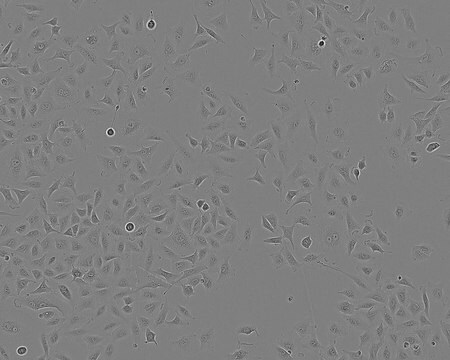DMS 153
95062827, human lung (liver metastasis), Not specified
Sign Into View Organizational & Contract Pricing
All Photos(1)
About This Item
UNSPSC Code:
41106514
Recommended Products
product name
DMS 153, 95062827
biological source
human lung (liver metastasis)
growth mode
Semi-adherent aggregates
karyotype
Modal no. 41-42
morphology
Not specified
products
Not specified
receptors
Bombesin, Epidermal growth factor (EGF)
technique(s)
cell culture | mammalian: suitable
relevant disease(s)
metastasis
shipped in
dry ice
storage temp.
−196°C
Cell Line Origin
Human Caucasian lung small cell carcinoma, metastasis to liver
Cell Line Description
DMS 153 was isolated from the liver of a 44 year-old male patient at autopsy who had been treated with cytoxan and methotrexate. The cells were identified as small cell carcinoma of the lung (SCLC) and secrete moderate quantities of calcitonin (CT) and calcitonin gene related peptide (CGRP). Production of adrenocorticotropin (ACTH), bombesin (BN), 17 β-estradiol and oxytocin-neurophysin (OT-NP) has also been reported. The expression of cell surface antigens Leu-7, HLA-DR, My 23 (defined by AML-2-23 monoclonal antibody), the AML-1-99 defined antigen and CR3 receptor (defined by the OKM antibody) has been shown. DMS 153 cells produce receptors for BN and epidermal growth factor (EGF) and are tumourigenic in athymic, nude mice.
Application
Human lung tumour model
DNA Profile
STR-PCR Data:
Amelogenin: X,Y
CSF1PO: 10
D13S317: 13
D16S539: 12,13
D5S818: 12
D7S820: 8,10
THO1: 7,9.3
TPOX: 11
vWA: 14,15
Amelogenin: X,Y
CSF1PO: 10
D13S317: 13
D16S539: 12,13
D5S818: 12
D7S820: 8,10
THO1: 7,9.3
TPOX: 11
vWA: 14,15
Culture Medium
Waymouth′s MB 752/1 + 2mM Glutamine + 10% Foetal Bovine Serum (FBS) (Heat Inactivated).
Subculture Routine
Split sub-confluent cultures (70-80%) 1:3 i.e. seeding at 2-4x10,000 cells/cm2 using 0.25% trypsin or trypsin/EDTA; 5% CO2; 37°C.Cells grow in large clumps.
Other Notes
Additional freight & handling charges may be applicable for Asia-Pacific shipments. Please check with your local Customer Service representative for more information.
Certificates of Analysis (COA)
Search for Certificates of Analysis (COA) by entering the products Lot/Batch Number. Lot and Batch Numbers can be found on a product’s label following the words ‘Lot’ or ‘Batch’.
Already Own This Product?
Find documentation for the products that you have recently purchased in the Document Library.
Our team of scientists has experience in all areas of research including Life Science, Material Science, Chemical Synthesis, Chromatography, Analytical and many others.
Contact Technical Service

